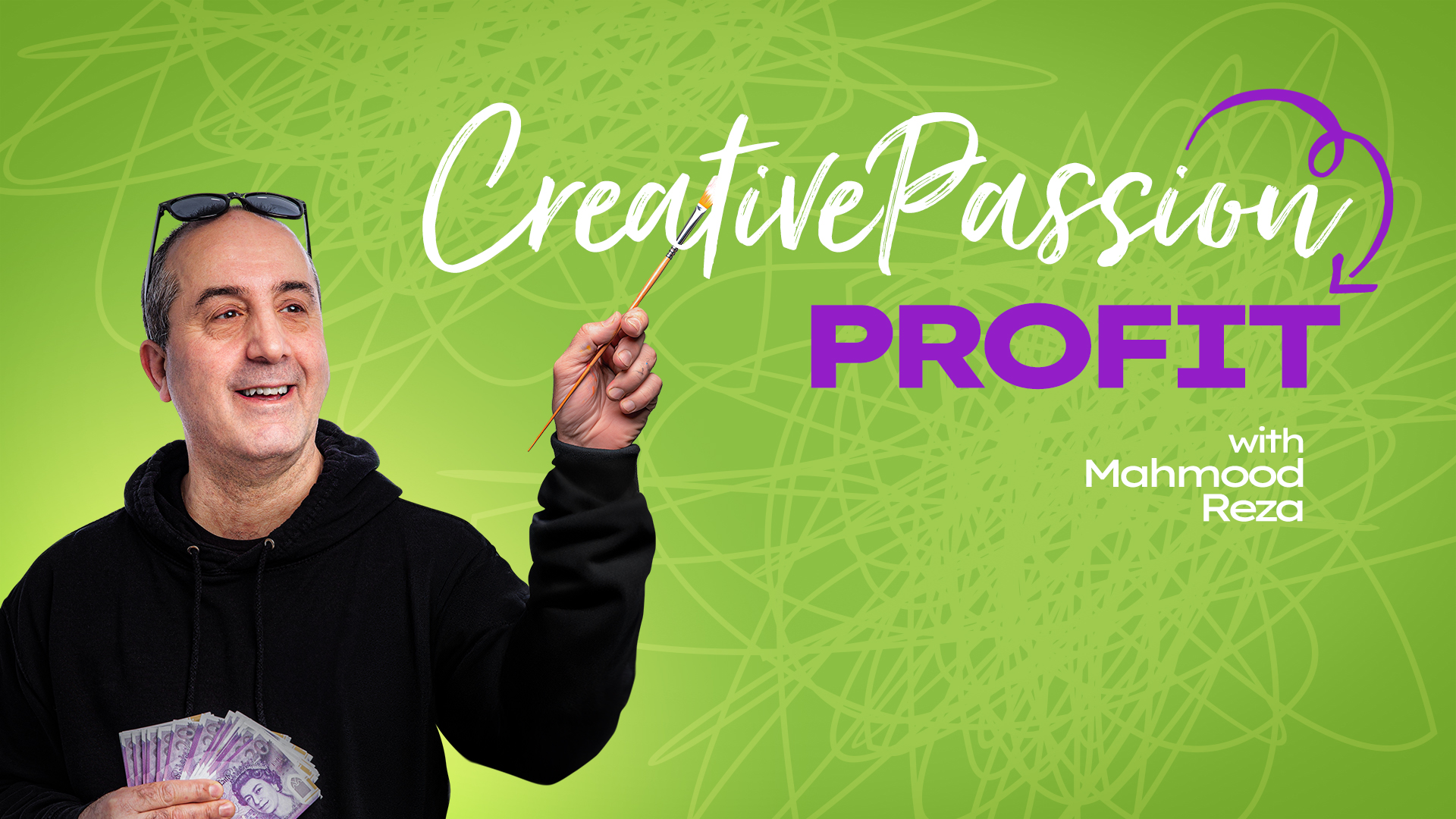Overwhelmed by creative goals? Try SMART Targets!
Are you feeling bogged down by creative goals that seem too big, too vague, or just plain out of reach? If so, this episode of "From Creative Passion to Profit" is just for you.
I often hear from creatives who are overwhelmed by ambitions that feel a galaxy away, and I know how frustration can quickly turn into stalled momentum.
In this week’s episode, I break down how turning your dreams into SMART targets—Specific, Measurable, Achievable, Relevant, and Time-bound objectives—can be a game changer.
Whether your goal is to earn more from your creative work, grow your business, or simply regain control over your workflow, this episode offers actionable guidance and plenty of real-world examples tailored for artists, makers, and anyone serious about their craft.
Throughout the episode, I walk you through the exact process for creating SMART targets that work in both personal and business contexts.
Join me, and you’ll walk away equipped to Plan it, Do it, and Profit—one specific, meaningful target at a time.
Timestamped Summary:
- [00:00:00] – Introduction: Why creative goals can feel overwhelming and how SMART targets help break the cycle.
- [00:00:54] – What makes SMART targets so powerful? Clear comparison between vague goals and structured targets; introduction to the SMART mnemonic.
- [00:01:37] – S (Specific): Turning wishful intentions into concrete commitments with examples for both fitness and business.
- [00:02:14] – M (Measurable): The importance of numbers and tracking progress towards your goals.
- [00:02:49] – A (Achievable): The need for realistic, accepted goals and the value of accountability communities.
- [00:03:17] – R (Relevant): Ensuring your targets align with your long-term creative ambitions and life.
- [00:03:51] – T (Time-bound): Setting deadlines and adapting the framework to your personal business context.
- [00:04:15] – Why SMART targets trump traditional goals, reducing anxiety and supporting incremental progress.
- [00:04:44] – Takeaway challenge: Set one SMART target this week and join the Numbers Knowhow community.
- [00:05:12] – Episode wrap: Moving from creative passion to profit by planning, acting, and achieving your goals.
Mentioned in this episode:
Find out more about Budgetwhizz
Find out more about Budgetwhizz
Transcript
Do you ever feel overwhelmed by your creative goals?
Speaker:Do they seem light years away, almost like they're floating in a distant
Speaker:galaxy, untouchable and out of reach? Well,
Speaker:you're not alone. In this week's podcast episode of From
Speaker:Creative Passion to Profit, I'm going to show you how smart targets
Speaker:will be your creative compass. They'll break down your big dreams
Speaker:into doable chunks, reduce that heavy feeling of overwhelm, and
Speaker:help you take real, confident steps towards your goals. So let's crack
Speaker:on
Speaker:now. Firstly, why do smart targets matter now? Sometimes
Speaker:our goals are just too vague, too distant, or maybe just too big.
Speaker:And that's when commitment wobbles, motivation dips, and we feel
Speaker:stuck. Smart targets help you avoid that. They give
Speaker:your creative ambition structure, just like scaffolding for your
Speaker:dreams. And instead of saying, I just want to make more money from
Speaker:my art, a smart target might be I'll sell
Speaker:five original pieces via Instagram by the 30th of June.
Speaker:Do you notice that difference? It's clear, it's doable, it's affirmative,
Speaker:and it gives you momentum. Smart, as in mnemonic, stands for
Speaker:specific, measurable, achievable, relevant and time
Speaker:bound. Let's break each of those down and bring it to life with real
Speaker:world examples. S is for
Speaker:specific. Here we're clear, we're focused. We avoid
Speaker:woolly and fluffy phrases like I might or possibly
Speaker:may occur. Use powerful affirmations like
Speaker:I will or I must. Now, by way of example,
Speaker:instead of getting into that framework where you say I want to get fitter,
Speaker:I want to improve my fitness, say I will walk
Speaker:30 minutes on a daily basis, or if you're applying that to a business
Speaker:goal, I will reduce my phone use after 8pm to
Speaker:improve my wellbeing. Now this makes your intention concrete. It's not
Speaker:just wishful thinking. There's something specific, there's something definite
Speaker:about that. Now, M is for measurable. There's a phraseology that
Speaker:goes around that says if you cannot measure something, it becomes
Speaker:impossible to manage it. You can only manage what you can measure. Now
Speaker:you do need to track success. Whether it's minutes walked, items
Speaker:sold, hours spent on client work. Numbers will give you that
Speaker:clarity. Now, by way of personal example, I will do an average of
Speaker:30 minutes of moderate intensity activity daily. If improving your
Speaker:health is your thing, would be a great example. Applying that into your business.
Speaker:I will check emails only twice daily to reduce my
Speaker:distraction and my stress levels. A is for achievable
Speaker:or acceptable. Your goals are your goals
Speaker:accepted by you and if needed, by those around you who
Speaker:are working with you or supporting you in some way. Saying, I can
Speaker:see myself doing this. If it helps, involve a business friend,
Speaker:a mentor, somebody who can act as your accountability buddy. Even
Speaker:better, join our artist community, which is
Speaker:specifically dedicated and focused just for artists and creatives
Speaker:like you. It's a free community. More of that later on. Now, whether
Speaker:you're launching a new product, building a new habit, or creating
Speaker:regular content, start from a place of belief and commitment.
Speaker:Now. We're on the R Now. R is for relevance. Every goal
Speaker:has to connect your bigger picture. Don't just copy what others are doing.
Speaker:Ask yourself, does this move me closer to the kind of
Speaker:creative life I want for me? If it was specific, I will
Speaker:reduce my screen time and phone use after 8pm measurable.
Speaker:I'll stop checking emails after 8pm achievable.
Speaker:I'll set do not disturb on my my phone, turn off my
Speaker:notifications and make sure I tell clients relevant.
Speaker:This helps me rest, reset and be more productive and time
Speaker:bound. I'm going to implement this within the next two months. All of these
Speaker:things are contextual and you need to adapt it for your business, not
Speaker:somebody else's. Now in summary, why does smart work? Well,
Speaker:smart targets act like markers on your creative journey. They don't
Speaker:overwhelm and they're a guide. And here's the thing. Targets are
Speaker:kinder than goals are. A goal is binary. Hit or miss a target.
Speaker:Just like playing game of darts, you can still score even if you don't hit
Speaker:the ball tight. Now, smart targets let you aim with a sense of purpose.
Speaker:Even if you veer slightly, you're still heading in the right direction.
Speaker:They reduce anxiety, they build confidence, and they remind you that
Speaker:progress is progress. Now what's the takeaway task here? Well,
Speaker:set yourself one smart target and here's a creative challenge
Speaker:for you. Grab a notebook. Write down one smart target for your week.
Speaker:Maybe it's about building your portfolio, finding new clients, or
Speaker:carving out downtime. And summary folks. Setting
Speaker:smart targets means more than just a box ticking exercise. It's
Speaker:about reclaiming control, building your confidence, and making sure your
Speaker:creative dreams do not just stay as dreams. Now that's it for this week
Speaker:on. From creative passion to profit. If you found this episode helpful and I hope
Speaker:you have share it with a fellow creative. Subscribe for more weekly
Speaker:Goodness. Join the community, Come onto our newsletter and
Speaker:our mailing and keep in touch with what's going on. Until next time, Set
Speaker:smart targets. Plan it do it and profit.




